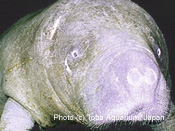- 2001 Status Report
- Chad
- Nigeria
- FAO Report, Nigeria
- Le Lamantin
- USFWS Profile
- Animal Info
- UNEP WCMC
- GISBAU
- Volta Basin, Ghana (EI)
- Volta Basin, Ghana (WT)
- DigiMorph 3-D images
Visit West African Manatees
The West African manatee is the least studied of all the manatees. Scientists believe it is similar in size and appearance to the West Indian manatee and that it lives in similar habitats: rivers, estuaries, coastal marine environments. Long-term research projects are hampered by political unrest and lack of funds. Very few photographs of this species are available.
 Bahari,
our West African Manatee Ambassador, is named after an African word that means "Sea
Man". Bahari represents the least studied sirenians. Photos of West African
manatees very rare; our Ambassador's image is from an animal on display in the
Toba Aquarium in Japan. Although we know very little about this species,
scientists think they are similar to the West Indian manatees. They are found in
coastal marine and estuarine habitats, and in fresh water river systems along
the west coast of Africa from the Senegal River south to the Kwanza River in
Angola, including areas in Gambia, Liberia, Guinea-Bissau, Guinea, Sierra Leone,
Ivory Coast, Ghana, Mali, Nigeria, Cameroon, Gabon, Congo, and Zaire. Recently,
manatees have also been described 1000 miles inland in
Chad. Although
crocodiles and sharks occasionally kill manatees in Africa, their only
significant threats are from humankind, such as poaching, habitat loss, and
other environmental impacts. Photo (c) Toba Aquarium/
Seapics.com; Bahari, SI's West
African Manatee Ambassador (c) Sirenian International, Inc.
Bahari,
our West African Manatee Ambassador, is named after an African word that means "Sea
Man". Bahari represents the least studied sirenians. Photos of West African
manatees very rare; our Ambassador's image is from an animal on display in the
Toba Aquarium in Japan. Although we know very little about this species,
scientists think they are similar to the West Indian manatees. They are found in
coastal marine and estuarine habitats, and in fresh water river systems along
the west coast of Africa from the Senegal River south to the Kwanza River in
Angola, including areas in Gambia, Liberia, Guinea-Bissau, Guinea, Sierra Leone,
Ivory Coast, Ghana, Mali, Nigeria, Cameroon, Gabon, Congo, and Zaire. Recently,
manatees have also been described 1000 miles inland in
Chad. Although
crocodiles and sharks occasionally kill manatees in Africa, their only
significant threats are from humankind, such as poaching, habitat loss, and
other environmental impacts. Photo (c) Toba Aquarium/
Seapics.com; Bahari, SI's West
African Manatee Ambassador (c) Sirenian International, Inc.
A Mermaid Myth, from Bahari, our West African Mermaid Ambassador
There are many diverse African indigenous/religious traditions, but the most notable are the Mami Water spirits found in various regions along the western coast of Africa. �Maame Water�, also spelled �mami water�, has been a central character in many riverside and coastal communities in West African. According to local lore, �Maame Water� is a sea goddess -- a source of absolute beauty and money. But, she has also been known to over-turn canoes and lure victims down to her watery kingdom.
Scientists from the Institute of Aquatic Biology of the Centre for Scientific and Industrial Research (CSIR) and the Wildlife Department in Ghana believe that "Maame Water," is really the large aquatic herbivorous mammal we know as the West African manatee!
Dr. Mamaa Entsua-Mensah, a research fellow of the Institute, said the female Manatee looks like a woman when they surface to inhale fresh air at night. "When spotted in night, its scaly body against the moonlight creates the impression of half fish and half woman," adding that the female manatee has two breasts with teats and dwells in tropical waters, whether fresh or saline. "Because they are mammals, they have lungs and hence the need for them to take in air through their lungs."
Entsua-Mensah, said "�because of the breast with teats, when people sight the mammals jumping out of the sea in the night to take in long deep breath of air, they are perceived as half woman, half fish." Studies conducted in Ghana by the institute and the Wildlife Department indicate that the manatee could be found in the Abbey lagoon and the Volta estuary. "They are also found in such rivers in Ghana as Dayi, Asukawkaw, Obusum, Sene and Oti within the Volta Lake.
The fishermen consider "Maame Water" as sacred. She cannot be talked about openly except after certain rituals. Among fishermen in the Niger Delta in Nigeria, "Maame Water" is considered a "powerful woman who is very generous and very jealous". Nigerian folk stories are told about persons whose fortunes have changed dramatically when they married "Maame Water", the mermaid, but lost everything when they became unfaithful to her.
In West Africa, where manatees are still hunted for food, the art of catching manatees is very specialized. Secrets are handed down from father to son and only certain families have the 'juju' to hunt the mammal.
-- information for this article came from the Panafrican News Agency and from a paper by Rosalind Hackett entitled �Mermaids and End-Time Jezebels�.
